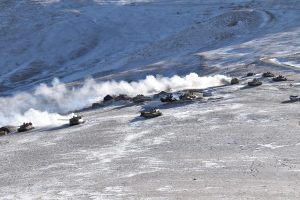The Russian invasion of Ukraine in February 2022, which started a destructive war that continues today, was a watershed moment in warfare and diplomacy in the 21st century and an inflection point in the development of the post-Cold War global order.
Not having fought a foreign war since 1979, the Chinese political and military leadership is undoubtedly studying the conflict with great interest. It has been reported that Beijing has begun to review its own strategic vulnerabilities that could be exploited during a war and has sought measures to address them across various domains. Chinese leaders have ordered subordinates to limit their economic exposure to potential Western sanctions as well as to stress-test China’s economic bottlenecks.
On the military front, China will certainly draw lessons from Russia’s invasion and study closely the bloody urban warfare and use of drones, among other things. Although it is unlikely that Russia’s operational difficulties and tactical drawbacks will shake China’s determination to eventually take control of Taiwan, Beijing will attempt to examine the mistakes and adapt its own operations and plans. Russian failures could lead to readjustments of China’s force posture. In the long term, China’s reforms could give greater confidence to the Central Military Commission and People’s Liberation Army (PLA), which might increase their appetite for taking risks. Ultimately, the lessons China may take away from the situation and a shifting military posture, if any, will be of paramount importance to understanding China as a global power.
Subsequently, the conclusions that China draws from the war are of major concern to the world. It is to be seen whether developments in Eastern Europe over the past year have emboldened or deterred Beijing from acting on its several disputes and territorial claims with Taiwan, in the South China Sea, and along the Line of Actual Control (LAC) with India.
While China is interested in expanding its sphere of dominance in the Indo-Pacific region, it is likely going to be more cautious when it comes to an invasion of Taiwan, with Russia’s setbacks highlighting possible flaws in China’s plans. However, Beijing’s calculus may differ when it comes to other disputes, given Xi Jinping’s mention of winning “local wars” in his work report at the 20th Party Congress in October. Crucially, the divided global response to Russia’s war, the limited effects of sanctions, and an increasingly self-reliant and insulated Chinese economy could spur adventurism on various fronts when combined with the PLA’s reforms and strengths. Stability in some of Asia’s most sensitive flashpoints hangs in the balance.
Regarding India, China’s actions along the LAC are of particular concern. If Beijing is emboldened by the lessons drawn from the war in Ukraine – and resulting increased confidence in its military performance – we could see a more aggressive China on the disputed Sino-Indian border. There have been reports of several scuffles since the deadly Galwan valley clash along the Eastern Sector of the LAC, bordering the Indian state of Arunachal Pradesh. This could lead to recurring grey-zone and salami-slicing tactics, thereby increasing mistrust between the two sides, which could spiral out of control.
Furthermore, New Delhi has made it clear that overall bilateral ties with Beijing depend on tranquility on the border and has since moved closer to the United States and the West. With that in mind, China could take advantage of a distracted Washington and Europe to dictate its positions vis-a-vis India. China’s probing the LAC has also been viewed as sending a message to New Delhi on its shift toward the West, and low-level engagements across the LAC could become the new normal, forcing heightened vigilance at all times by the Indian armed forces.
Ultimately on the geopolitical chessboard, the more Russia depends on China as the war progresses, the more Beijing will be able to shape Moscow’s attitudes, including those toward New Delhi. Similarly, the more China-India tensions grow, China’s efforts to wean Russia away from India will only increase. It is, therefore, in India’s interest to pay close attention to the conflict in Ukraine from China’s perspective and take note of the discourse emanating from the country.































